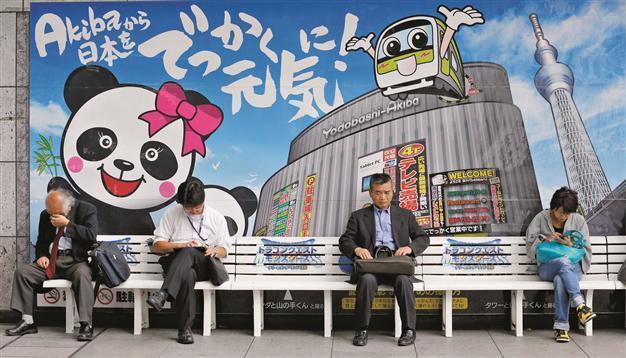Japan’s economy stuttering ahead of China islands crisis
TOKYO - Agence France-Prese

People rest on a bench in front of an advertisement of an electronics shop in Tokyo. Japan’s core consumer prices fell 0.3 percent in August from a year earlier, down for the fourth straight month, official data shows. REUTERS photo
Japan released yet more worrying figures on Sept. 28 showing the world’s third largest economy was already stuttering before a damaging territorial dispute erupted with its largest trading partner. Factory output in August shrank by a bigger-than-expected 1.3 percent from the previous month, the industry ministry said as it admitted production activity was weakening.The decline was much sharper than an average market forecast of a 0.4 percent drop.
“Industrial production appears to be weakened,” the ministry said in a statement, downgrading its overall assessment. It had said a month ago that production appeared to be flat.
Japan’s export-driven economy is struggling to right itself following the March 2011 earthquake and tsunami disaster, while also suffering from Europe’s debt crisis, slowing Chinese demand and the strong yen.
Japanese businesses are now worried about taking a hit from the effects of a flare-up in the row between Tokyo and Beijing over the ownership of islands in the East China Sea.
Japan’s nationalization in September of three islands in the chain, called Senkaku in Japan and Diaoyu in China, triggered anti-Japan rallies across China. Major Japanese companies were forced to close factories.
Auto giants Toyota and Nissan said on Septs 26 they would cut production in China because demand for Japanese cars has dropped, while airlines have seen large cancellations of seats on China-bound flights.
Mooted Chinese consumer boycotts of Japanese products are also unsettling firms sending goods to China, Japan’s number one export market.
The industry ministry, citing a survey of production forecasts by manufacturing companies, said factory output is expected to fall by a further 2.9 percent in September and to be flat in October.
‘Sluggish auto output’
Mizuho Securities Research and Consulting senior economist Norio Miyagawa said the ministry’s outlook survey suggested “output may lose steam even further.” “We are likely to see sluggish output at least until October, especially in the automobile sector,” he told Dow Jones Newswires, noting the row with China was a downside risk for the economy.
“If the current disputes with China become prolonged, that will damage Japan’s output and the economy.” Kengo Suzuki, forex strategist at Mizuho Securities, said “a fall in foreign demand could further pressure the Japanese economy”.
It could also raise expectations for further monetary easing in the long run, he added. The Bank of Japan last week announced it would spend an extra $128 billion buying bonds to take its total monetary easing effort past $1 trillion as it seeks to revitalise the economy. The move followed similar bond-purchasing plans by the bank’s US and European counterparts earlier in the month.
Economists attributed the August production fall to weakening domestic consumer spending and stocked-up inventories as well as China’s corporate performance and the debt crisis in Europe.
Data released by the internal affairs ministry Sept. 28 showed no sign of Japan breaking out of deflation. Core consumer prices, which excludes volatile prices of fresh food, fell for the fourth straight month in August, down 0.3 percent year-on-year.
















